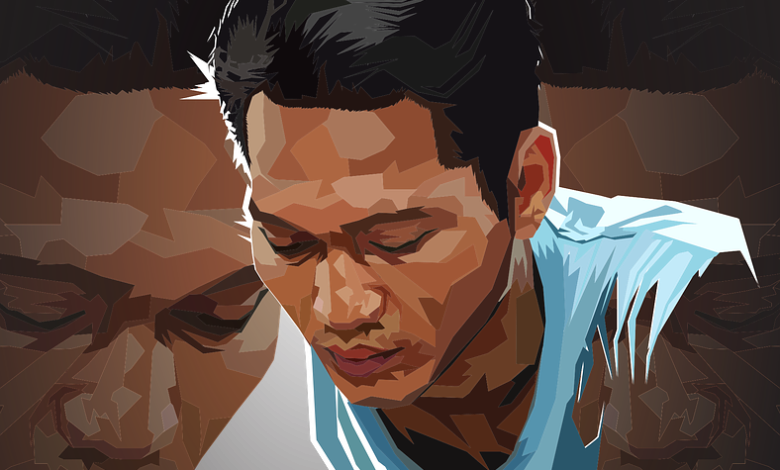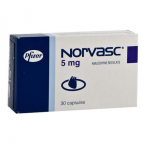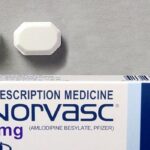Amlodipine Horror Stories: 5 Patients Recount Their Horror

Amlodipine is a medication that is used to treat high blood pressure (hypertension) and angina (chest pain). It belongs to a class of drugs known as calcium channel blockers, which work by relaxing the blood vessels and improving blood flow. Amlodipine was first approved for medical use in the United States in 1992 by the Food and Drug Administration (FDA). It was developed by Pfizer, Inc. and is sold under the brand name Norvasc.
The development of amlodipine was based on research into the mechanism of action of calcium channel blockers. The first calcium channel blocker, verapamil, was discovered in the 1960s and was found to be effective in treating angina. However, it had significant side effects and was not suitable for all patients. In the 1980s, researchers discovered that amlodipine had a longer half-life than other calcium channel blockers and was therefore more effective at reducing blood pressure over a 24-hour period. This made it a more convenient option for patients with hypertension.
Today, amlodipine is one of the most commonly prescribed medications for hypertension, and is included on the World Health Organization’s List of Essential Medicines. It is also available in generic form and is widely used throughout the world. However some people have had very unpleasant experience with the medication. In this article titled the “Amlodipine Horror Stories” we shall be taking at such stories and have to prevent unpleasant experiences with amlodipine.
Amlodipine Side Effects
Like all medications, amlodipine can have side effects, and some people may have negative experiences with the drug. However, it is important to note that many people take amlodipine without experiencing any problems, and the vast majority of side effects are mild and temporary.
That being said, some people have reported negative experiences with amlodipine, which may include:
1. Dizziness or lightheadedness: Amlodipine can cause a drop in blood pressure, which may result in dizziness or lightheadedness. This can be especially problematic for older adults or people with low blood pressure.
2. Swelling: Amlodipine can cause swelling in the ankles, feet, or hands. This is due to the medication’s effect on blood vessels, which can cause fluid to leak into the surrounding tissues.
3. Fatigue or weakness: Some people may experience fatigue or weakness while taking amlodipine. This can be due to the medication’s effect on the cardiovascular system, which may result in decreased oxygen delivery to the muscles.
4. Headache: Amlodipine may cause headaches in some people, which can range from mild to severe.
5. Gastrointestinal problems: Amlodipine can cause gastrointestinal problems, such as nausea, diarrhea, or constipation.
It is important to note that these side effects are relatively rare, and most people who take amlodipine do not experience any problems. If you are taking amlodipine and are experiencing any concerning symptoms, you should talk to your doctor. They may be able to adjust your dosage or switch you to a different medication.
“Amlodipine Horror Stories”
Bee who had a horrible experience with the medication wrote “I am currently experiencing a great deal of suffering. In the month of June, I have been to the emergency room three times, urgent care twice, and my primary care physician once. Despite my symptoms worsening, I have been unable to find anyone who will take my concerns seriously. I am experiencing heart palpitations, muscle cramps, anxiety, and sharp pain in my upper left back. Although I have been taking amlodipine for four months and it has lowered my blood pressure, I am still unable to function properly. The last two electrocardiograms I have had show premature ventricular contractions (PVCs), which I have been told are harmless, but they feel like a heart attack to me. Every doctor I have spoken to has assured me that amlodipine could not be the cause of my symptoms. However, I am not convinced that they are correct, as the only reason I started taking the medication was to treat my high blood pressure. I am in desperate need of a doctor who will listen to my concerns. Please keep me in your thoughts and prayers.”
The story of Rash is no different he wrote “After taking 5mg of amlodipine for a week, I increased the dosage to 10mg. Although it effectively lowered my blood pressure, I experienced severe anxiety and panic attacks as a side effect. Enduring a month of discomfort, my doctor switched me to a low-dose diuretic which has been effective in controlling my blood pressure and eliminating my extreme anxiety. While my mother has been taking amlodipine for years without any issues, it wasn’t the right medication for me. Overall, I wouldn’t consider it a terrible drug, but it wasn’t suitable for my specific needs”.
Another patient who share her Amlodine horror Story is Kimberly. She wrote Swollen legs and ankles in the evening were observed within the first month of using Amlodipine, whereas such symptoms were not present when using Diltiazem. However, after four months, severe muscle pain has developed suddenly in the upper arms, shoulders, and thighs, leading to limited movement. The doctor has discontinued the use of Amlodipine, but even after one month, there has been little improvement in the pain. Pain relievers such as Piroxicam and Paracetamol, which were previously effective, have not significantly reduced the pain.
The last on our list is a 61 year old angry patiend with a bad amlodipine story. He shared his experience as follows; “My blood pressure had been marginally high at around 130/90 for years, but recently it began to climb. My doctor prescribed diuretics initially, but they made me feel like I was chewing cotton balls. I was then switched to Lisinopril, but it caused dizzy spells that came out of nowhere and lasted for several minutes. I then tried Losartan, starting with 50mg and increasing to 100mg, but it was a disaster, causing brain fog, slower reaction time, anger, irritability, and difficulty concentrating. I am currently taking amlodipine, 10mg once per day, which has lowered my blood pressure, but has caused me to feel listless, depressed, and experience more brain fog and somnolence. I understand that medical practices are incentivized to keep patients within certain guidelines, including blood pressure control, but I feel that there is little consideration for overall mental health and well-being. At this point, I am considering whether the benefits of medication are worth the negative impact on my quality of life and whether it may be better to forego medication and accept the risks associated with high blood pressure”.
How To Prevent Unpleasant Experiences With Amlodipine
To prevent unpleasant experiences with amlodipine, here are some tips to follow:
1. Take amlodipine exactly as prescribed by your doctor. Do not take more or less of it than recommended.
2. Follow a healthy lifestyle, including a balanced diet, regular exercise, and adequate sleep. These lifestyle changes can help reduce the risk of high blood pressure and other health problems.
3. Tell your doctor about any other medications you are taking, including over-the-counter drugs and herbal supplements. Amlodipine may interact with certain medications, so it’s important to inform your doctor of all the medications you are taking.
4. Be aware of the potential side effects of amlodipine, which may include dizziness, headache, flushing, and swelling in the legs or ankles. If you experience any of these symptoms, contact your doctor.
5. Avoid alcohol while taking amlodipine, as it can increase the risk of side effects.
6. If you have liver or kidney disease, tell your doctor before taking amlodipine. These conditions may affect how the medication is processed in your body, and your doctor may need to adjust your dose.
7. Do not stop taking amlodipine without first consulting your doctor. Suddenly stopping the medication can cause your blood pressure to rise rapidly, which can be dangerous.
By following these tips, you can help prevent unpleasant experiences with amlodipine and ensure that the medication is effective in treating your condition.





